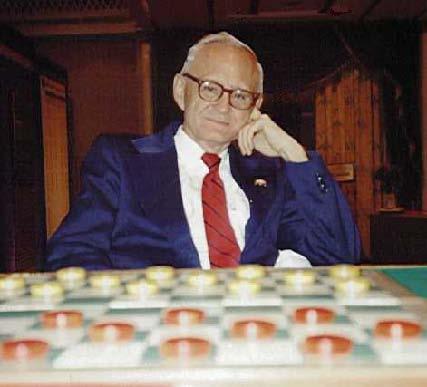Meet History’s Best Checkers Player

In 2011, author Malcolm Gladwell came out with a book titled “Outliers: The Story of Success.” In it, he popularized the 10,000-hour rule, “claiming that the key to achieving world-class expertise in any skill, is, to a large extent, a matter of practicing the correct way, for a total of around 10,000 hours” per Wikipedia. The “rule” is controversial (to say the least) and is obviously incomplete — not everyone has the potential to be successful, despite how much one practices. (For example, you can practice jumping with a basketball in hand for your whole life, but if you’re only five feet tall, you’re unlikely to win a slam dunk contest.)
But what if you were really good at math — so good, you could earn a Ph.D. in the subject? Could you master something math-related and become world-class in it? If you take a man named Marion Tinsley at his word, maybe you could. In grad school, Tinsley asserted, he spent 10,000 hours — the equivalent of eight hours a day, five days a week, fifty weeks a year, for five years — studying the game of checkers.
And he was very, very good at it.
Checkers (or draughts in British English) has been around for thousands of years in one shape or form. So it’s hard to say who is truly the best checkers player in history. But that said, Tinsley was often given that honor. He won his first world championship in 1955, and, according to his obituary in the New York Times, lost only nine times for the rest of his checkers-playing career. (Other sources say that he had only seven losses.) And that’s nine games, not matches. His losses were so notable that one YouTuber decided to recreate one of those matches, seen here; it has more than 15,000 views as of this writing.
Tinsley’s greatest opponents weren’t people, though. In 1990, a computer scientist named Jonathan Schaeffer entered a computer called Chinook into the U.S. championships. It came in second with Tinsley taking the title, but the two never faced off — the format of the tournament didn’t require it. Their meeting, though, seemed inevitable — until a philosophical debate arose around whether a computer was eligible to compete for a world title. A subsequent New York Times article explains: “[Coming in second] should have earned Chinook the right to challenge [Tinsley] for the world championship, but the American Checkers Federation and the English Draughts Association refused to sanction a match.”
In 1992, the relevant parties came to a solution: a one-time event called the Man Versus Machine World Championship, a separate (but equal?) world title. Tinsley and the Chinook machine battled across the checkerboard in 39 distinct games. Tinsley, for the first time in years, lost some games — two, in fact. But ultimately, man prevailed — Tinsley took four games and the other 33 were draws. The brilliance of Dr. Tinsley wasn’t lost on Schaeffer; Wikipedia recounts the programmer’s experience:
In one game, Chinook, playing with white pieces, made a mistake on the tenth move. Tinsley remarked, “You’re going to regret that.” Chinook resigned after move 36, fully 26 moves later. The lead programmer Jonathan Schaeffer looked back into the database and discovered that Tinsley picked the only strategy that could have defeated Chinook from that point and Tinsley was able to see the win 64 moves into the future.
Tinsely and Chinook faced off one final time in 1994, playing six games all to draws before Tinsley retired, asserting that health reasons prevented him from continuing. He passed away a few months later from pancreatic cancer.
Bonus fact: While Tinsley wasn’t around to see it, ultimately, Chinook prevailed over the game of checkers. In 2007, Schaeffer published a paper claiming he had “solved” the game — a claim verified by the checkers community. As New Scientist reported, “the game was killed by the publication of a mathematical proof showing that draughts always results in a draw when neither player makes a mistake.”
From the Archives: Held in Check: A chess tournament where the players were captured (kind of).
Related: “Outliers: The Story of Success” by Malcolm Gladwell. Also, checkers.
